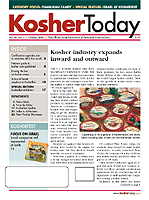Kosher Industry Expands Inward and Outward
 The U.S. kosher market has seen significant expansion over the past two decades through increased sales to mainstream consumers. Now, kosher purveyors are also looking to a core Jewish market to further build sales with a “two-track” approach. The U.S. kosher market has seen significant expansion over the past two decades through increased sales to mainstream consumers. Now, kosher purveyors are also looking to a core Jewish market to further build sales with a “two-track” approach.
Back in the early ’80s, kosher food purveyors could only dream of selling their kosher-certified products to mainstream American consumers. Kosher was just beginning to get the attention of a growing number of supermarkets that viewed it as an opportunity, not only with Jews who observed kashrus, but with health-conscious consumers and members of other religious groups.
Retailers recognized that kosher-observing Jews would be the engine for kosher sales, but they stood to benefit from the “crossover” consumers.
More than a quarter of a century later, a lot has changed for kosher. Most American bellwether food manufacturers have obtained kosher certification for most of their products. In fact, notes Rabbi Moshe Elefant of the Orthodox Union, the world’s largest kosher certifier, “Most of the growth in kosher today comes from line extension.”
OU-certified Wise Potato Chips, for example, long favored by many kosher consumers, recently launched Wise Choice, the company’s first line of all-natural healthy snacks, and all are either OU pareve or OU dairy.
Other kosher-certification agencies report that most of their new business activity revolves around certification applications for an ever-growing list of ingredients or small and mid-size companies seeking a kosher symbol.
Included in the latter are many manufacturers that do private labeling for companies that offer their products as kosher.
The kosher industry today is defined by the obvious “two-track” approach to increasing share in the kosher market, which is still growing by 12 to 15 percent a year after nearly a decade. Some kosher purveyors are targeting non-kosher consumers by securing shelf space among mainstream food categories in supermarkets and major discount stores like Wal-Mart, Sam’s Club, and Costco rather than in kosher food aisles.
Riding the craze for Mediterranean salads and pre-cut vegetables are such brands as Sabra and Bodek. Each has invested in building share in the core kosher market and is now focusing on a broader consumer base.
Some 18,000 supermarkets in the United States sell kosher products as part of a display, shelf or store within a store, and they have many choices among suppliers. Retailers often look to established companies to provide the bulk of their kosher merchandise.
Distributors like Kehe, Gourmet Award, HKS Marketing and Millbrook benefit from this quest for “one stop” suppliers and have become dominant players in many areas of the kosher market.
Moving kosher products into mainstream can pay off handsomely. In a 2003 study, the Mintel Organization, a consumer-goods research group, found that 28 percent of all Americans knowingly buy a kosher product. A surprising 35 percent of those surveyed told Mintel that they bought kosher on the basis of flavor.
This represents a major change in Americans’ perception of kosher, which was once considered synonymous with inferior quality despite its spiritual advantages (many still believe that the food is “blessed” by a rabbi).
While kosher companies continue to seek out opportunities in mainstream markets, they realize there is also opportunity within the loyal kosher base. The new management and ownership of Empire Kosher Poultry recently added the certification of Washington Heights, N.Y., based K’hal Adas Jeshurun (KAJ) to its OU as a message that its kosher standards are acceptable to a broad base.
Hebrew National, which marketed to millions of non-Jews with its “we answer to a higher authority” message, is hoping that its new certification by the Triangle-K will induce more Jews to buy their products. The company estimates that some 15 to 17 percent of its consumers are Jewish.
While the Conservative movement embraced the change, the Orthodox did not, since Hebrew National products are not glatt in any event. The opportunities in the core market have also not been lost on some of Israel’s largest dairies.
Both Tnuva (distributed by Laish Foods of Brooklyn, N.Y.) and Strauss (distributed by Blue & White/Sabra in Queens, N.Y.) have begun selling in New York and elsewhere with an initial goal of penetrating the kosher market.
Other Israeli companies like Of Tov (distributed by Kessler Bothers/Woodridge Meats, Woodridge, N.Y.), which acquired the Hod Lavan brand and is now only known by the Of Tov brand, have also made significant inroads.
Kosher companies have good reason to look inward for growth. Recent census data, including the 2002 National Jewish Population Study, indicates that the Orthodox Jewish community is growing faster than other segments of the estimated 5.2 million Jews in America.
In fact, current estimates are that the Orthodox segment represents some 15 to 20 percent of American Jewry and a soaring birth rate that will likely double that population in the next decade while other segments of the Jewish population will actually decline due to intermarriage and assimilation.
While the ’90s will ultimately be recognized for taking kosher mainstream, the decade of 2000 may very well be remembered as the era of the “two-track” success. |